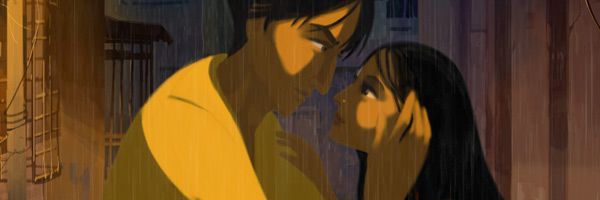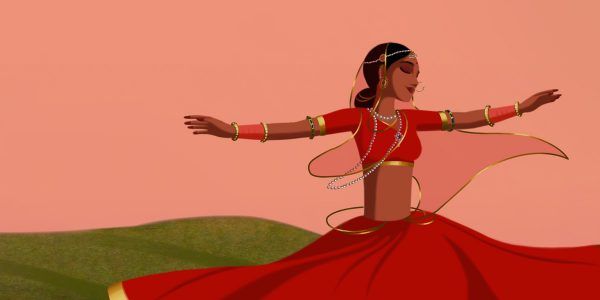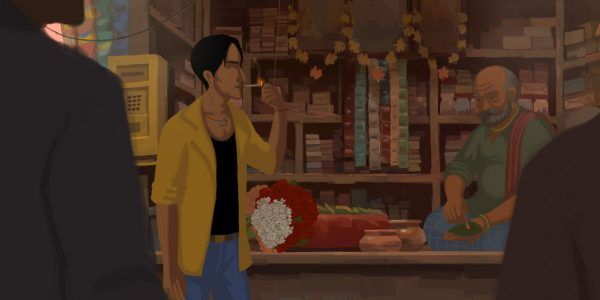One of the best parts of attending a film festival is getting to see emerging filmmakers showcasing their talent and proclaiming that they’re ready to be future power players. While the focus is usually on the big titles with known names, there are some feature debuts that, while not worthy of every single award, are more of a calling card for an exciting new voice in the industry. Following is considered one of the lesser films by Christopher Nolan, but it heralded the arrival of an emerging talent. The same can be applied to Gitanjali Rao’s animated directorial debut, Bombay Rose, which is narratively unfocused, but beautifully told and directed.
Opening with a visually stunning scene that literally builds India’s biggest metropolis of Mumbai (Bombay) from rough sketch into fully realized and breathing city, Bombay Rose is a showcase of raw talent and the wonders of animation. The film reportedly took six years to make, during which self-taught animator Gitanjali Rao worked as writer, director, editor and art designer for the vibrant look of the painstakingly hand-painted movie, and it shows. Few cities have looked as dazzling and full of life as Bombay Rose’s Mumbai, which is full of bright colors, exquisite attention to the smallest details in the city, and a large and diverse cast that makes the city feel lived-in.
If there’s a big flaw in Bombay Rose, it’s the overstuffed and unfocused script. Even after so many years of work, the story feels like it never advanced past the first draft. The film follows a series of characters and their lives in the city, with the only thing connecting them being a single rose that changes hands. The central characters are Hindu working-class girl Kamala (Cycil Khare) who is escaping an arranged marriage and spends her days selling flower garlands and nights working as a dancer at an illegal nightclub. Her earnings and those of her grandfather (Virendra Saxena), a watchmaker without much work, all go towards schooling for Kamala’s sister Tara (Gargi Shitole). Tara takes English lessons from aging film star Mrs. D’Souza (Amardeep Jha) who is haunted by the memories of her glory days, and her long-lost love. Meanwhile, Kamala starts a flirt with Samil (Amit Deondi), a young Muslim guy living a tenuous life on the streets after fleeing Kashmir where his parents were executed, but Kamala’s brutal gangster and pimp Mike (Makarand Deshpande) threatens to ruin everything.
The individual stories are interesting enough that they could have made for either brilliant short films or a single great feature, but by drawing all the stories together with nothing but flowers, Rao lets the narrative feel sloppy and unresolved. There will be those who are enthralled by the art style and the love letter to Mumbai and will be able to forgive the unfocused narrative, but even at 93 minutes, Bombay Rose feels overstuffed.
That being said, the real star of the movie is the animation, with Rao changing the animation style throughout the movie. In an early scene we visit a movie theater where a big, splashy Bollywood movie is playing, and so the animation becomes big and bold, with the on-screen actors looking bulky and masculine – almost like American superheroes. Then an expressionist art style is used for what is the bulk of the movie and the interconnected stories being told, including a fantastic series of fantasy-like daydreams involving medieval princes and princesses. Most strikingly, the film occasionally goes back to the Mumbai of old, at which point the color drains to black and white and the huge metropolis disappears to take us back in time to a long-gone era.
Bombay Rose takes on big themes for such a short movie: there’s the love between a Hindu and a Muslim, the love between two women, and the love of the city for Bollywood cinema – which is satirized and homaged. The film questions the power of cinema as escapism and whether we’re just fooling ourselves or if there’s actual power in the big screen. There is a darkness to the story that Rao may not have been able to explore in live-action, with a dangerous Mumbai where death is always waiting around the corner and broken dreams follow everyone in town. Thankfully, the film balances that darkness with moments of levity, and a wonderful soundtrack made by Yoav Rosenthal that pays tribute to classic Indian cinema while giving the film a sense of wonder and hope.
Bombay Rose is an achievement in and of itself. It was written, designed, and directed by a woman, in an industry dominated by men, and in a country that rarely relies on animation to tell stories. While the craft at hand is admirable, the unfocused and overstuffed storytelling makes Bombay Rose feel as more of a calling card promising a bright future, than a great film in its own right.
Rating: C+
For more of our TIFF 2019 coverage click here, and peruse links to the rest of our reviews below:
- Abominable
- The Aeronauts
- Bad Education
- A Beautiful Day in the Neighborhood
- Calm with Horses
- Color out of Space
- Dolemite Is My Name
- Ford v Ferrari
- Freaks
- The Goldfinch
- Guns Akimbo
- Harriet
- Jojo Rabbit
- Judy
- Just Mercy
- Hustlers
- Knives Out
- The Laundromat
- Lucy in the Sky
- Marriage Story
- Motherless Brooklyn
- Radioactive
- Sea Fever
- Sound of Metal
- The Two Popes
- True Story of the Kelly Gang
- Uncut Gems
- Weathering With You




